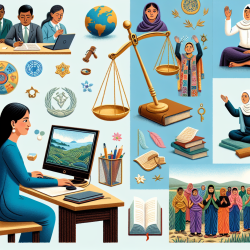Introduction
In the realm of special education and therapy, the ability to empathize, understand, and adapt to diverse challenges is crucial. The research article titled Documentation of Human Rights Abuses among Rohingya Refugees from Myanmar provides valuable insights into the systematic violence faced by the Rohingya people. This blog aims to guide practitioners in improving their skills by implementing the outcomes of this research or encouraging further exploration.
Understanding the Context
The Rohingya people have endured decades of persecution, culminating in a violent campaign by the Myanmar government in August 2017. This involved systematic eviction, destruction of homes, and severe human rights abuses. The research conducted by Haar et al. (2019) documents these atrocities through interviews and physical examinations of survivors, highlighting patterns of violence and the urgent need for accountability.
Implementing Research Outcomes
As practitioners, it is essential to integrate research findings into practice. Here are some ways to enhance your skills:
- Empathy and Understanding: Recognize the trauma and challenges faced by refugees and individuals from conflict zones. This understanding can inform your approach to therapy and education.
- Use of Protocols: Familiarize yourself with the Istanbul Protocol, which guides the documentation of torture and inhuman treatment. This can enhance your ability to document and report any signs of abuse or trauma effectively.
- Advocacy: Use your position to advocate for the rights of marginalized groups. This includes ensuring access to education and therapy for all, regardless of background.
- Continued Learning: Stay informed about global human rights issues. This knowledge can enrich your practice and broaden your perspective.
Encouraging Further Research
The documentation of human rights abuses is a critical area that requires ongoing research. Practitioners are encouraged to delve deeper into this field to better understand the complexities and contribute to meaningful change. Consider the following steps:
- Collaborate with Researchers: Engage with academic institutions and research organizations to participate in studies related to human rights and trauma.
- Conduct Field Studies: If possible, conduct field studies to gather firsthand data on the impact of human rights violations on education and therapy.
- Share Findings: Publish and share your findings with the wider community to raise awareness and drive policy changes.
Conclusion
The research on Rohingya refugees underscores the importance of documenting human rights abuses and the role practitioners can play in addressing these issues. By implementing research outcomes and engaging in further studies, practitioners can enhance their skills and contribute to a more equitable and just world.
To read the original research paper, please follow this link: Documentation of human rights abuses among Rohingya refugees from Myanmar.










